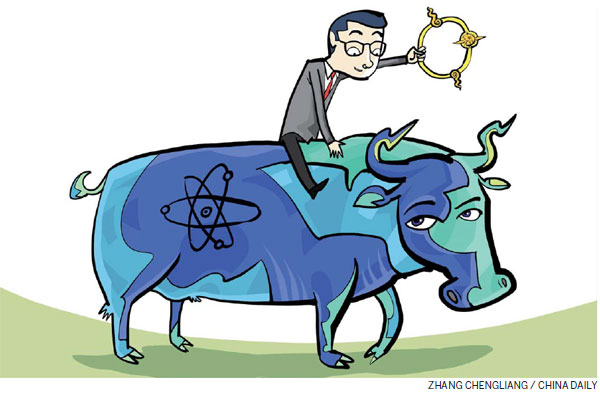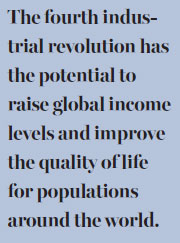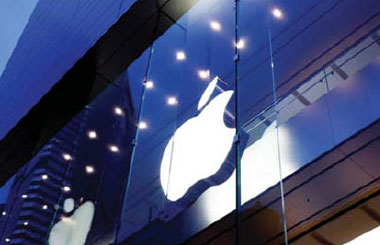Humanity must steer tech revolution
Updated: 2016-01-15 07:41
By Klaus Schwab(China Daily Europe)
|
|||||||||||
There has never been a time of greater promise, or greater potential peril, if the best parts of human nature do not guide changes
We stand on the brink of a technological revolution that will fundamentally alter the way we live, work and relate to one another. In its scale, scope and complexity, the transformation will be unlike anything humankind has experienced before. We do not yet know just how it will unfold, but one thing is clear: The response to it must be integrated and comprehensive, involving all stakeholders of the global polity, from the public and private sectors to academia and civil society.
The original Industrial Revolution used water and steam power to mechanize production. The second used electric power to create mass production. The third used electronics and information technology to automate production. A fourth, digital revolution has been occurring since the middle of the last century. It is characterized by a fusion of technologies that is blurring the lines between the physical, digital and biological spheres.

When compared with previous revolutions, the fourth is evolving at an exponential rather than linear pace. Moreover, it is disrupting almost every industry in every country.
The possibilities of billions of people connected by mobile devices are unlimited. And these will be multiplied by emerging technology breakthroughs in fields such as artificial intelligence, robotics, the Internet of Things, autonomous vehicles, 3-D printing, nanotechnology, biotechnology, materials science, energy storage and quantum computing.
Already, AI is all around us, from self-driving cars and drones to virtual assistants. Digital fabrication technologies, meanwhile, are interacting with the biological world on a daily basis. Engineers, designers and architects are combining computational design, additive manufacturing, materials engineering and synthetic biology to pioneer a symbiosis between microorganisms, our bodies, the products we consume and even the buildings we inhabit.
The fourth industrial revolution has the potential to raise global income levels and improve the quality of life for populations around the world.

In the future, technological innovation will also lead to a supply-side miracle, with long-term gains in efficiency and productivity. Transportation and communication costs will drop, logistics and global supply chains will become more effective, and the cost of trade will diminish, all of which will open new markets and drive economic growth.
As economists Erik Brynjolfsson and Andrew McAfee have pointed out, the revolution could also yield greater inequality, particularly in its potential to disrupt labor markets. As automation substitutes for labor across the entire economy, the net displacement of workers by machines might exacerbate the gap between returns to capital and returns to labor. On the other hand, it is also possible that this will result in a net increase in safe and rewarding jobs.
We cannot foresee which scenario is likely to emerge, and history suggests the outcome is likely to be some combination of the two. However, I'm convinced that talent, more than capital, will represent the critical factor of production. This will give rise to a job market increasingly segregated into low-skill, low-pay and high-skill, high-pay segments, which in turn will lead to an increase in social tensions.
Inequality represents the greatest societal concern associated with the fourth industrial revolution. The largest beneficiaries of innovation tend to be the providers of intellectual and physical capital (innovators, shareholders, investors), which explains the wealth gap between those dependent on capital versus labor. Technology is therefore one of the main reasons why incomes have stagnated in high-income countries: the demand for highly skilled workers has increased while the demand for workers with less education and lower skills has decreased. The result is a job market with a strong demand at the high and low ends, but a hollowing out of the middle.
This helps explain why so many workers are fearful that their incomes, and those of their children, will continue to stagnate. It also helps explain why middle classes around the world are increasingly experiencing a pervasive sense of dissatisfaction.
An underlying theme in my conversations with global CEOs and executives is that the acceleration of innovation and the velocity of disruption are hard to comprehend or anticipate, and that these drivers constitute a source of constant surprise, even for the best connected. Indeed, across all industries there is clear evidence that the technologies that underpin the fourth industrial revolution are having a major impact on business.
On the supply side, many industries are seeing the introduction of new technologies that create entirely new ways of serving existing needs and significantly disrupt existing industry value chains. Major shifts on the demand side are also occurring, as growing transparency, consumer engagement and new patterns of consumer behavior force companies to adapt the way they design, market and deliver products and services.

A key trend is the development of technology-enabled platforms that combine both demand and supply to disrupt existing industry structures. These platforms, rendered easy to use by smartphones, convene people, assets and data, thus creating entirely new ways of consuming goods and services.
There are four main effects that the latest revolution has on business - on customer expectations, product enhancement, collaborative innovation and organizational forms. Customers are increasingly at the epicenter of the economy. Moreover, new technologies make assets more durable and resilient, while data and analytics are transforming how they are maintained.
Overall, the inexorable shift from simple digitization (the third revolution) to innovation based on combinations of technologies (the fourth) is forcing companies to reexamine the way they do business. But the bottom line is the same: Executives need to understand their changing environment, challenge the assumptions of their operating teams, and relentlessly and continuously innovate.
The fourth revolution will also change not only what we do, but also who we are. It will affect our identity and all the issues associated with it: our sense of privacy, notions of ownership, consumption patterns, the time we devote to work and leisure, and how we develop our careers, cultivate our skills, meet people and nurture relationships.
I'm an early adopter of technology, but sometimes I wonder whether the inexorable integration of technology in our lives could diminish some of our quintessential human capacities, such as compassion and cooperation.
Neither technology nor the disruption that comes with it is an exogenous force over which humans have no control. All of us are responsible for guiding its evolution, in the decisions we make on a daily basis as citizens, consumers and investors. We should grasp the opportunity and power we have to shape the fourth industrial revolution and direct it toward a future that reflects our common objectives and values.
To do this, we must develop a comprehensive and globally shared view of how technology is reshaping our environments. There has never been a time of greater promise, or greater potential peril.
In the end, it all comes down to people and values. In its most pessimistic, dehumanized form, the fourth industrial revolution may have the potential to "robotize" humanity and deprive us of our heart and soul. But as a complement to the best parts of human nature - creativity, empathy and stewardship - it can also lift us into a new collective and moral consciousness based on a shared sense of destiny. It is incumbent on us all to make sure the latter prevails.
The author is founder and executive chairman of the World Economic Forum. This article was first published in Foreign Affairs. The views do not necessarily reflect those of China Daily.
(China Daily European Weekly 01/15/2016 page8)
Today's Top News
Chinese people revealed as most optimistic
in global survey
COSCO offers 700m euros for Greece’s Piraeus Port
Istanbul bomber entered Turkey as refugee
Bird flu case confirmed in eastern Scotland
Cosco poised for Piraeus control
US President Obama delivers final State of the Union address
Iran confirms detention of 10 US marines
Ten killed in Istanbul blast
Hot Topics
Lunar probe , China growth forecasts, Emission rules get tougher, China seen through 'colored lens', International board,
Editor's Picks

|

|

|

|

|

|






